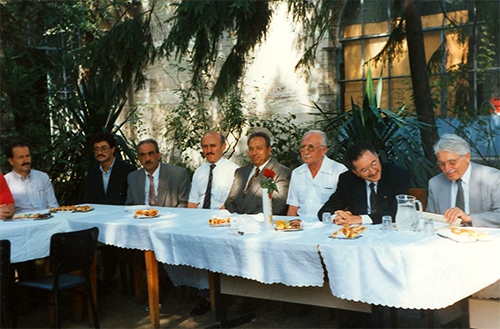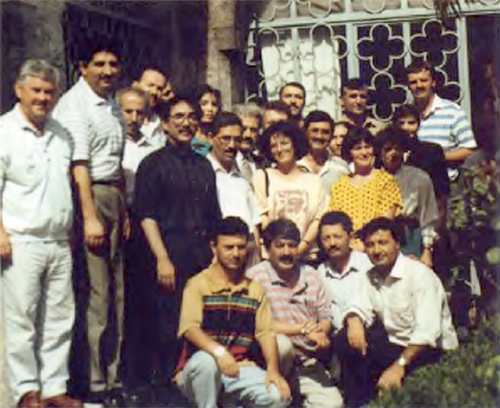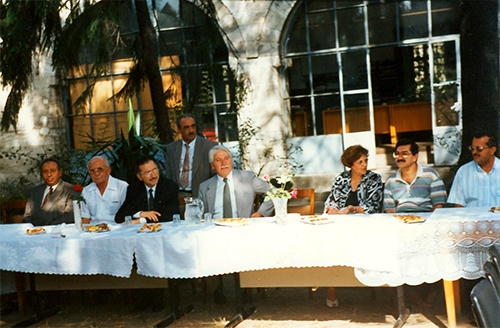The Second Training Course on cataloguing, under the supervision of Professor Ekmeleddin Ihsanoglu, was held at Suleymaniye Library in Istanbul, and was organized by Al-Furqan Islamic Heritage Foundation in co-operation with IRCICA (Research Centre for Islamic History, Art and Culture) and the Suleymaniye Library.
The course took place in Istanbul, between 29th August and 30th September 1994. It was advertised in a number of professional journals. Letters were sent to libraries with holdings of uncatalogued manuscripts. It was stipulated that candidates should have a degree in Library Science, or Arabic, or Islamic Studies, in addition to having a considerable knowledge of the Arabic language, to be able to follow the course and to catalogue Arabic manuscripts.

A total of 24 students from the Balkan region, Turkey and the Former Soviet Union attended this course. Participants were selected from among nominees from Albania, Azerbaijan, Bosnia and Herzegovina, Bulgaria, Croatia, Kazakhstan, Kosovo, Kyrgyzstan, Tajikistan, Turkmenistan and Uzbekistan. These participants were joined by participants from Turkish institutions, including Istanbul University, Ankara University and the General Directorate of Waqf.
The training courses were given in a variety of languages, such as Arabic, English, Turkish and Persian, and translation was provided into both Turkish and Arabic.
The curriculum for the course was designed with the co-operation of IRCICA, the Department of Library Science, the Cairo University, and several members of Al-Furqan Manuscripts Centre's Board of Experts and International Advisory Board.
The course lasted five weeks and was divided into a theoretical (2 weeks) and a practical (3 weeks) section.
Trainees took theoretical courses on historical development, cataloguing and classification of Islamic manuscripts, as well as on the methods and principles employed in the study of manuscripts. The course also included sessions on the development of writing materials, such as papyrus, various types of paper, ink, as well as the establishment and development of libraries. Also included were lectures on the arts relevant to manuscripts and their historical development, such as calligraphy, miniatures, bookbinding, gilding and so on.
The topics covered in the theoretical section were the following:
- The history of Arabic, Turkish and Persian manuscripts
- The history of the Islamic manuscripts in Africa, the Indian sub-continent and the rest of the world
- The history of Arabic script (calligraphy) in its various schools
- Materials used in Islamic manuscripts (paper, ink, leather, etc.) - Binding - Illumination and aesthetics
- The history of the cataloguing of Islamic Manuscripts - References used in the cataloguing of Islamic manuscript
- The history of the major collections
- Some thoughts on preservation and conservation.

The practical section of the course was undertaken with the co-operation of a library holding Islamic manuscripts. The participants were able to work with the manuscripts for four hours every day, and with the guidance of an experienced cataloguer they went through the process of cataloguing and exploring the particular difficulties that arose during the work. The trainees were asked to complete practical tasks, such as researching bibliographic information on rare manuscript works and filling out bibliographic sheets which are used in the preparation of the catalogues.

The Foundation was very fortunate in being able to recruit a core teaching staff of highly qualified and practised professionals to teach in this course, among whom were: Professor Ibrahim Chabbouh (Tunisia), Professors Abdu-l-Sattar al-Halwagi and Nasrallah Mubashir al-Tarazi (Egypt), Professor Mohammed Bencharifa (Morocco), Professor Qasim al-Samarrai (Netherlands), Professor Iraj Afshar (Iran), Professor John Hunwick (USA), Professor Yahya al-Sa'ati (Saudi Arabia) and Mr Muammer Ulker (Turkey).
Following the successful conclusion of the course, certificates were presented to the trainees.

